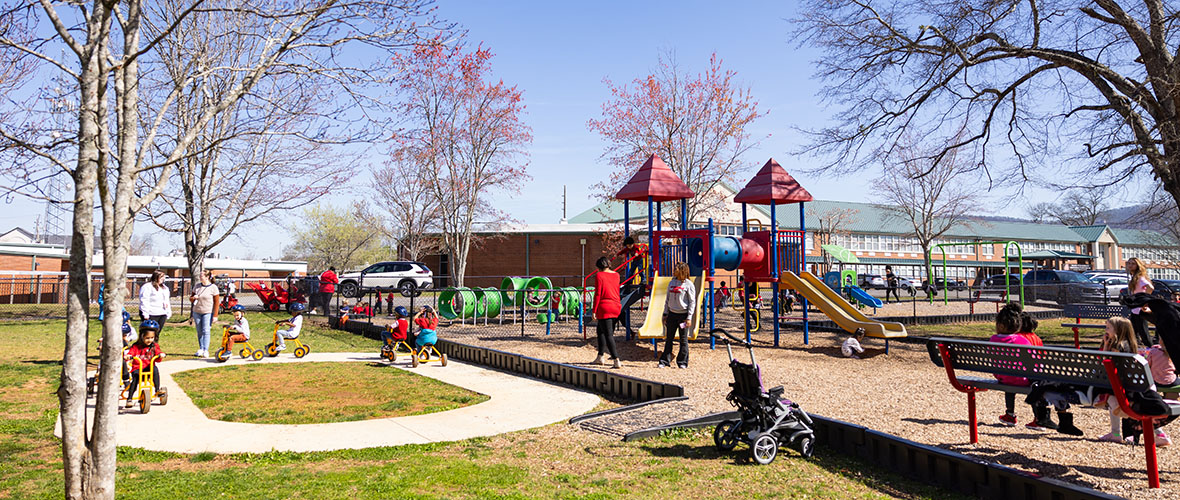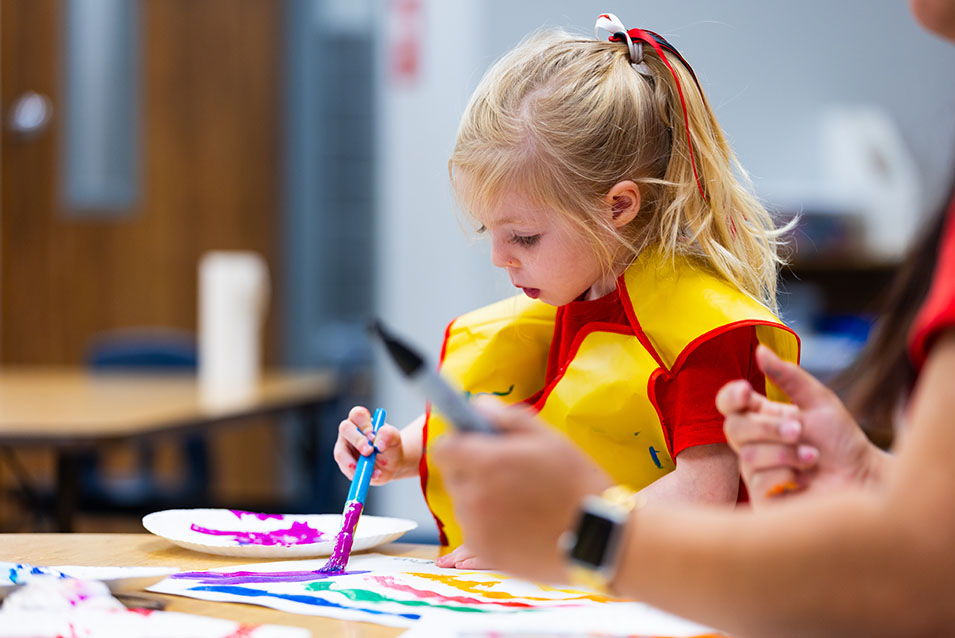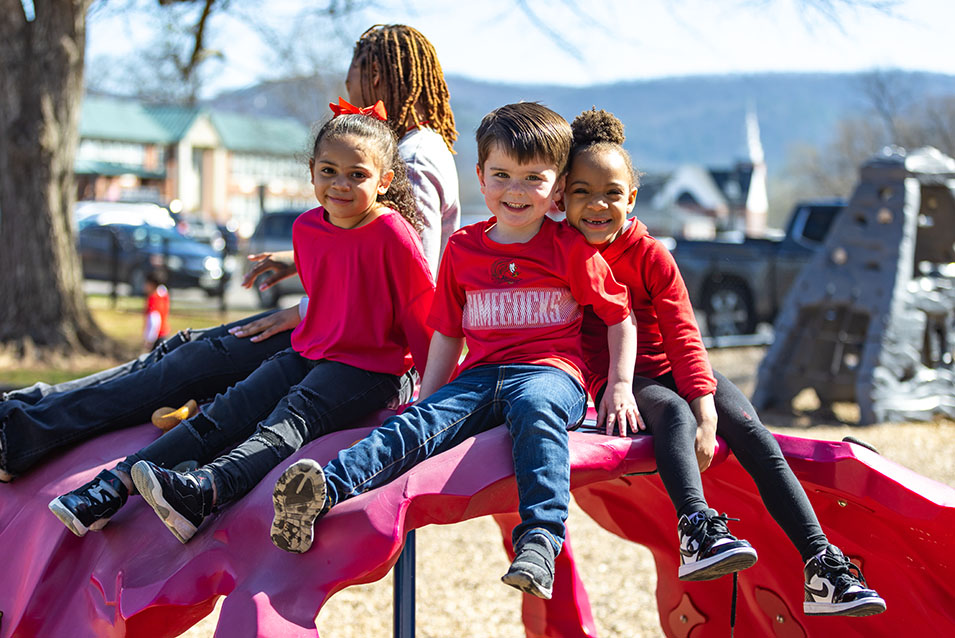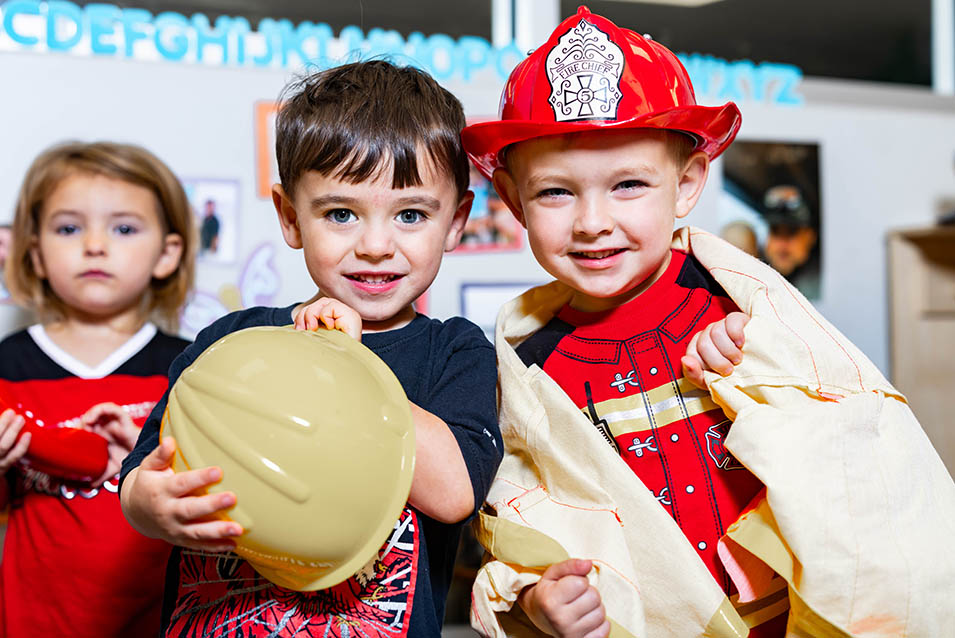The Program at Jax State
The Child Development Center (CDC) has been a part of Jacksonville State University’s campus for over sixty years. Originally designed as a half-day preschool class for three and four-year-olds in the Family and Consumer Sciences department, the former CDC was located in East Mason Hall.
In Fall 2022, the program expanded and relocated to the former Kitty Stone Elementary School, now the College of Education and Professional Studies (CEPS) Complex. Located at 115 College Street SW, the CDC welcomes children from 6 weeks to four-years-old (Pre-Kindergarten). The facility is open Monday-Friday from 7:30am until 6:00pm.
The CDC enables families to “go to school together,” encouraging classroom engagement and family participation. The proximity of the CDC for Jax State students, staff, and faculty allows families to participate in programs and be involved in their child’s school during the day.
Curriculum and Activities
The CDC follows the Creative Curriculum Learning Environment in all its classrooms. Children are encouraged to investigate using hands-on activities to discover their world. This developmentally appropriate curriculum is research-based to include strategies to best support young learners. Play, literacy, numeracy, and STEAM lessons are essential elements of the program that are evident in CDC classrooms throughout the day.
Activities are planned according to the age and developmental level of each child in care and provide children with a variety of experiences. The daily activities include a flexible balance of indoor and outdoor activities, active and quite play, and individual and group activities. The activities provided will expose the children to a variety of cultures and will encourage children to use and develop language and literacy skills, use large and small muscles, think creatively, learn new ideas and skills, and participate in imaginative play. The activities are designed to provide protection from excess fatigue and over stimulation and to ensure that each child can be successful and feel good about himself or herself. Some of the activities include:
- Language development: e.g., books, music, story time, fingerplays, flannel board stories
- Large muscle skills: e.g., balls, hula hoops, bean bags, swinging, outdoor play
- Small muscle skills: e.g., arts/crafts, stringing beads, pegboards, blocks
- Creative expression: e.g., dramatic play, puppets, music/instruments, flannel board
- Self-help skills: e.g., assist with mealtime preparation, dress self for outdoors
- Literacy skills: e.g., books, story board, alphabet and writing games
PLAY is the major component of our program. Enough time, materials, and space will be provided for children to actively explore the world around them.
Classroom Openings
While the facility does serve the public at large, affiliates of Jax State (including faculty, staff, and students) receive priority placement as well as a tuition discount for their childcare. As to be expected, a running waitlist is common for the facility. If you would like to be added to the waitlist, please email the PreAdmission Form to the facility’s Assistant Director Nikki Valencia, at nzarzabal@jsu.edu. There is a $50 non-refundable fee for the CDC waitlist.
NOTE: We do encourage family tours of the facility before making a decision on waitlist application. Please call 256-782-8659 to schedule. Tours are available Mondays-Fridays from 9:00 am until 4:30 pm
Classroom openings typically only occur during the year when a currently enrolled child leaves or is promoted to another classroom. The CDC holds class “move up” each May, and an increased number of children are accepted at the start of the new school session in August of each year.
When a position becomes available the parent/guardian will be contacted via phone and email. The family will be given 72 hours to accept or decline the position. If a family accepts the space, they will need to submit the following forms within 2 weeks of your child’s state date at the JSU CDC:
- Copy of the child’s birth certificate
- Valid State of Alabama Certificate of Immunization OR a Valid State of Alabama Certificate of Medical Exemption OR a Valid Alabama Certificate of Religious Exemption
- Copy of Parent/Guardian Valid State or government ID
- Signed copy of Consent form to Photograph, Audio, Video Record (To be completed and signed upon your child’s admission to JSU CDC)
NOTE: Failure to respond to messages will be considered declining the position. If a position is offered and declined the child will be removed from the waiting list.
Around the CDC
The Child Development Center at Jax State current provides direct care services to (+/-)110 children and families.
- Infant room (1)
- Ones, Twos, and Threes Classrooms (1 each)
- Multi-Age Classrooms (2) for easy transitioning
- Spacious preschool classrooms equipped with developmentally appropriate resources and educational technology (3)
- STEAM lab for preschool students (1)
- Aftercare Classroom (1)
- Teacher resource/workrooms (2)
- Gross motor indoor spaces in both PODs
- Individual playgrounds for infants/toddlers and preschool
- Extra room to allow privacy for nursing mothers
- CCAMPIS Program “drop-in” availability
- Laboratory/Research observation rooms to enhance the learning process for faculty, teacher candidates, parents and children
- Both PODs are locked 24/7 with an electronic entry system
- Security cameras inside/outside facilities
- 24/7 Campus Security through the University Department of Public Safety
- Fire, Severe Weather, and Intruder drills are routinely performed





